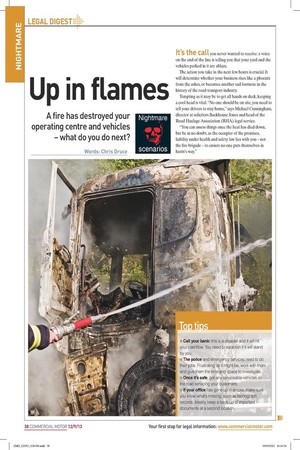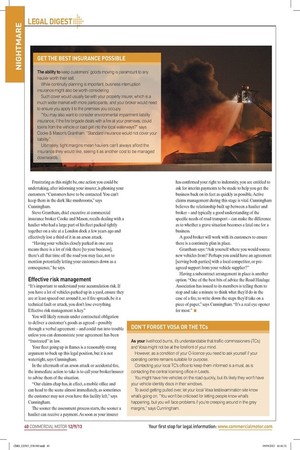Up in flames
Page 26

Page 27

If you've noticed an error in this article please click here to report it so we can fix it.
A fire has destroyed your operating centre and vehicles what do you do next? Words: Chris Druce
It's the call you never wanted to receive: a voice on the end of the line is telling you that your yard and the vehicles parked in it are ablaze.
The action you take in the next few hours is crucial. It will determine whether your business rises like a phoenix from the ashes, or becomes another sad footnote in the history of the road transport industry.
Tempting as it may be to get all hands on deck, keeping a cool head is vital. "No one should be on site, you need to tell your drivers to stay home," says Michael Cunningham, director at solicitors Backhouse Jones and head of the Road Haulage Association (RHA) legal service.
"You can assess things once the heat has died down, but be in no doubt, as the occupier of the premises, liability under health and safety law lies with you — not the fire brigade — to ensure no one puts themselves in harm's way."
Frustrating as this might be, one action you could be undertaking, after informing your insurer, is phoning your customers. "Customers have to be contacted. You can't keep them in the dark like mushrooms," says Cunningham.
Steve Grantham, chief executive at commercial insurance broker Cooke and Mason, recalls dealing with a haulier who had a large part of his fleet packed tightly together on a site at a London dock a few years ago and effectively lost a third of it in an arson attack.
"Having your vehicles closely parked in one area means there is a lot of risk there [to your business], there's all that time off the road you may face, not to mention potentially letting your customers down as a consequence," he says.
Effective risk management
"It's important to understand your accumulation risk. If you have a lot of vehicles parked up in a yard, ensure they are at least spaced out around it, so if fire spreads, be it a technical fault or attack, you don't lose everything. Effective risk management is key."
You will likely remain under contractual obligation to deliver a customer's goods as agreed — possibly through a verbal agreement — and could run into trouble unless you can demonstrate your agreement has been "frustrated" in law.
Your fleet going up in flames is a reasonably strong argument to back up this legal position, but it is not watertight, says Cunningham.
In the aftermath of an arson attack or accidental fire, the immediate action to take is to call your broker/insurer to advise them of the situation.
"Our claims chap has, in effect, a mobile office and can head to the scene almost immediately, as sometimes the customer may not even have this facility left," says Cunningham. The sooner the assessment process starts, the sooner a haulier can receive a payment. As soon as your insurer
has confirmed your right to indemnity, you are entitled to ask for interim payments to be made to help you get the business back on its feet as quickly as possible. Active claims management during this stage is vital. Cunningham believes the relationship built up between a haulier and broker — and typically a good understanding of the specific needs of road transport — can make the difference as to whether a grave situation becomes a fatal one for a business.
A good broker will work with its customers to ensure there is a continuity plan in place.
Grantham says: "Ask yourself where you would source new vehicles from? Perhaps you could have an agreement [serving both parties] with a local competitor, or preagreed support from your vehicle supplier?" Having a subcontract arrangement in place is another option. "One of the best bits of advice the Road Haulage Association has issued to its members is telling them to stop and take a minute to think what they'd do in the case of a fire, to write down the steps they'd take on a piece of paper," says Cunningham. "It's a real eye opener for most." •









































